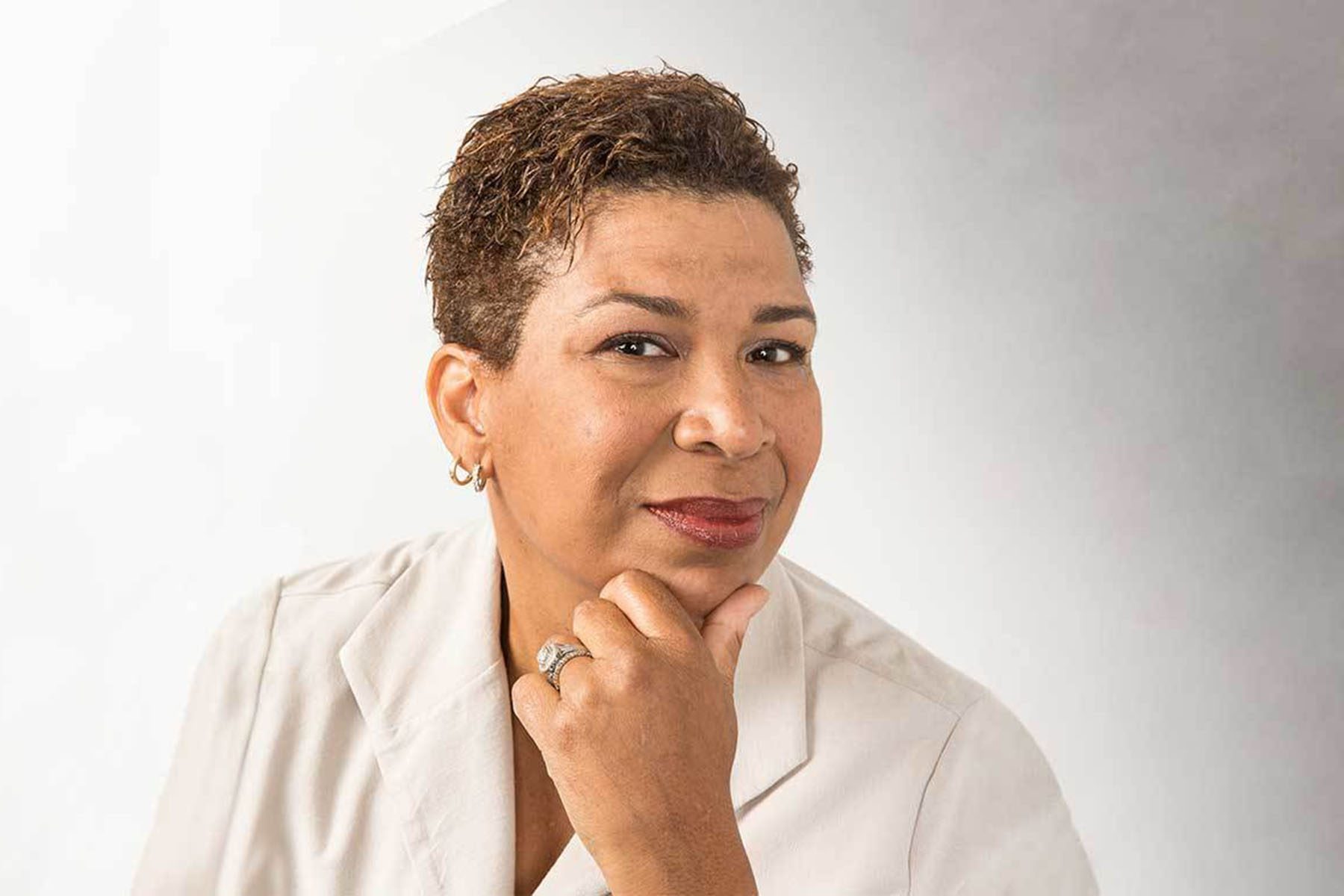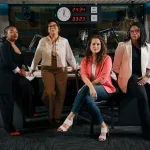Your trusted source for contextualizing the news. Sign up for our daily newsletter.
NPR announced Thursday that veteran journalist Michel Martin will join as a host at “Morning Edition” starting on March 27.
Michel Martin, the current host of the weekend edition of “All Things Considered” and the Saturday “Consider This” podcast, first joined NPR in 2006, making the move from television news to radio to launch her program “Tell Me More,” which aired on NPR member stations nationwide from 2007 to 2014. Her last day with “All Things Considered” will be March 12. Martin will take over the host seat previously held by Rachel Martin.
Martin has spent decades seeking out the untold stories of everyday people. She has reported on everything from politics and policy to music and fashion, tackling the kinds of kitchen table issues parents grapple with daily with the same attention she brings to her work covering the legacy of slavery in America. Her reporting is intimate, honest, respectful and generous, always prioritizing the voices of those whose lives and experiences she centers in her work.
Ahead of Thursday’s announcement, Martin spoke exclusively with The 19th about her hopes for NPR’s future, building trust and dismantling assumptions, navigating journalism as a mother, and the frank conversations she believes are needed in media.
Jennifer Gerson: You are someone who is not afraid to really poke at the corners of what we think about in terms of identity, gender and race and breathe a lot of nuance into those kinds of stories. What are some of the other kinds of stories you’re especially interested to tell from this new seat?
I’ve always seen my work as additive. I’ve never been a person who wants to throw tables over and knock water glasses over and scream, “This sucks!” because that’s not really my worldview. My worldview is more like, “That thing is interesting — but this is also interesting. What else can we do and who else can we talk to? Who is really missing from this conversation? What are the other points of view that we are not hearing?”
These [kinds of] stories have become easier to tell now because I think a lot more people are interested in those kinds of conversations, and it’s gotten a lot easier to get those conversations on air than it would have been 15 or 16 years ago. That’s true at NPR, but that’s true across all media.
What interests me now are some of the things related to the stories that we don’t want to talk about, the edges around some of the issues that we all feel uncomfortable to talk about. I think a lot of stories don’t fit into a neat binary and I would like to find a way to talk about those things. The great thing about NPR is that it’s leading the way with a big footprint on what it looks like to be willing to spend some time talking about things that are hard to talk about.
-
More from The 19th
- Amna Nawaz is stepping into history at PBS, and she hopes to make room for others like her
- This women-led nonprofit wants Los Angeles to recognize and prioritize its Indigenous population
- Mainstream education often neglects Black history. TikTok, Freedom Schools and other resources are bridging the gap.
What can having those conversations look like in this current media landscape? How do you hope to bring all your years of doing this kind of work into this new role?
I think a lot of us are worried right now. A lot of people seem to have decided that they only want to hear what they already agree with, so now we’re not in the business of creating knowledge or sharing knowledge but just reinforcing opinions that already exist.
I feel very strongly that the one and only way you can break through that is to be useful, to be compassionate and be consistent, to let people understand that you’re going to do your job as best you can, day in and day out. Hopefully, that will let them then trust you when you tell them something they don’t want to hear and give them reason to believe you.
One of the reasons I am most excited about coming to “Morning Edition” is to work with Erika Aguilar, the executive producer. She and I are very much in sync with the concept that you have to meet people where they are and have got to try and serve them — and serving them doesn’t mean necessarily just telling them what they want to hear. If you’re only telling people things they want to hear rather than the things they need to know, you’re not serving them.
If you had a family member who was in a bad way and you just busted in the front door and said, “Sit down, honey, and let me tell you what’s wrong with you” — that would not really be serving your purpose.
Throughout your career at NPR, you have been a significant voice in moving the network forward in its evolution in how it covers race. How do you feel like NPR has evolved here, and how would you describe what that shift has looked like?
Over the course of my career, one of the things that has really driven me crazy is the inability to describe something as racist when it obviously is, and using all of these euphemisms like “deeply conservative views” and things like that. I personally don’t understand why we have allowed that to go on for so long because that misidentifies what conservatism is. I don’t understand why “conservative” is code for “racist” anymore than I understand why “urban” is code for “Black.” Why can’t we just say what things are?
Just because I appreciate stating exactly what things are doesn’t mean I’m on some kind of warpath to label people. I don’t think labeling people as racist is any more productive than labeling somebody as an alcoholic. They’re not going to applaud you and say, “Thank you for telling me that.” But what you can do is accurately describe someone’s behavior.
I appreciate the fact that we are finally in a place where we can accurately describe behavior as racist, policies as racist, language as racist. I think that is a very big shift, not only at NPR but across the media.
Moving into this new role so many decades into this work, how do you think about how women get to exist as mothers within journalism?
There was one year when my kids were little that I filled out six W-2’s, because that’s how many babysitters I had. It was so hard when I had little kids and elderly parents who were getting older and frailer, and some days I just literally would sit in my car and cry. I’m not going to lie about that. I think it’s important for people to know that you can look around and be so sure that everybody else has it together, but I’m here to tell you that they don’t. They just don’t.
For me and my career, it’s been a combination of luck and timing and being really clear about what it is that’s most important to me. For example, “Morning Edition” obviously has a bigger audience than the show I am currently hosting, but that has never been a priority of mine. Maybe that’s because I trained with Ted Koppel at “Nightline,” and we were on at 11:30 at night. Throughout my career, I have been in these time slots that other people didn’t think were important. Why does that matter? Because I’m clear about what matters to me. And what matters to me is doing the stories I want to do in the way I want to do them with the people that I want to do them with. That’s been my north star.
What do you want other journalists to know, looking at you and where you are in your career at this very moment?
This is a really tough business, and it is tough on everybody. Do the best you can for as long as you can and do work that you can do and be proud of it. I think you have to try to do work that you are proud of, because you don’t know how long you’re going to be able to do it.
There was this time when I was at “Nightline,” and we all thought we were going to get canceled. Elie Wiesel had come in because he was friends with Ted Koppel, and Jim Carville was in for an interview, and for some reason they decided to speak to the staff because everyone knew we were on the bubble. And they said, “Most people get up in the morning and don’t get to decide what they’re going to do that day. Most people get up in the morning and have to do what someone tells them to do. Some people have to work all day on their knees, on their back. But you get to get up in the morning and decide what you are going to do that day. You get to decide to get up and serve the public in a way that is honorable, so don’t take that for granted. Don’t ever take that for granted and just enjoy every day.”
We had really thought they were going to be like, “Wow these people suck! How could they do this to you!” But that’s not what they said to us. They said that we had been given a privilege and to know it’s an incredible privilege — and so do your best, each day you get to do this.
What do you hope people learn from seeing you in the host seat at ‘Morning Edition’?
I’m lucky because in my time of when I was coming up, I never had to be the first to do anything. I saw Judy Woodruff anchoring and also raising her three kids. I saw Carole Simpson. I saw Cokie [Roberts], I saw Susan [Stamberg]. Cokie was like your best auntie down the hall. She would just magically appear at your door when you were having a really bad day and be like, “Hey, hang in there.” So I saw Cokie and Judy and Carole and it helped me. I hope seeing me helps other people, too.
I remember one time Barbara Walters spoke to all of the women at ABC when I was there, and it literally made me cry. She told a story about how she had a miscarriage at work on a Friday and went back to work on Monday and never told anyone. It broke my heart that she didn’t feel like she could. And guess what happened? Years later I had a miscarriage at work — and I told everybody.
You don’t want to make everything all about you. You want to be recognized for your work and not who you are. But I hope in sharing some of my struggles and triumphs that I’ve made it a little easier for other people to do that, too.
How do you think about how you help people check their own assumptions and how will you bring that to your work moving ahead?
We all change and we all grow as we get old, if we have the opportunity and the blessing of being able to get older.
Diane Sawyer once said to me that she was walking to work one day through the park and some man whistled at her or made some kind of a comment. She said to me, “You know what, when I was 20, I would have whipped around and been like, ‘How dare you?’ But now at my age, I think, ‘Well, you know what? These aren’t even my most flattering pants.’” I was younger when she told me this story and at that age, I was appalled. But now I’m like, “Yeah, I feel you.”
Hopefully we’re all on a continuum of experiences, where the outrage of the young is given space but also that there’s space given to asking questions like, “OK, but is this kind of response ideal? Is this really the best way to say this? Are we really moving forward if we handle this in this way?” That thinking also has to be given space. I’m just hoping that I can contribute to that.
I hope I get to do the things that I say I want to do, and I hope that people who know how to do the things that I don’t know how to do are going to help me. I’m just looking forward to taking advantage of the range of skill sets and experiences at “Morning Edition” that will add to my value.







